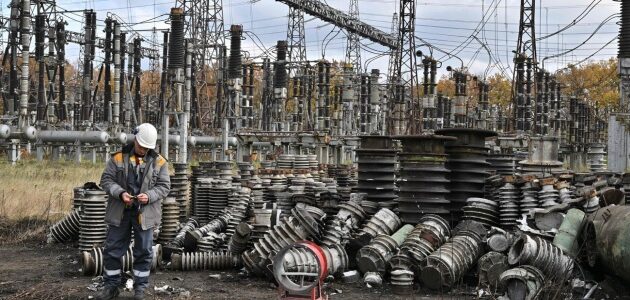
According to the KSE Institute (Kyiv School of Economics), direct losses and indirect losses of Ukraine’s energy sector as a result of Russia’s full-scale invasion exceed $56 billion, while the industry’s recovery needs are estimated at $50 billion.
These estimates are contained in the KSE Institute’s presentation presented during a meeting with energy company executives on August 7.
According to the KSE Institute, direct losses from physical damage to energy assets amounted to more than $16 billion, while indirect financial losses, including lost revenues and costs of restoring damaged energy facilities, amounted to more than $40 billion.
In terms of individual sectors of the energy complex, the electricity sector suffered the most from the full-scale war, with direct losses exceeding $11 billion and indirect losses exceeding $18 billion.
According to KSE Institute analysts, since the beginning of the full-scale war, Russia has occupied more than 16 GW of Ukrainian generation, including the largest in Europe Zaporizhzhia NPP with a capacity of 6 GW, Zaporizhzhia, Luhansk and Vuhlehiria TPPs with a total capacity of 7.7 GW, Sievierodonetsk and Myronivsk TPPs with 0.5 GW, as well as 1.2 GW of wind power plants and 0.9 GW of solar power plants. In addition, the Kakhovka HPP was blown up – 0.3 GW.
As of April 2023, the available capacity of the power system due to the occupation and massive hostile attacks since the beginning of the war had halved to 18 GW, which corresponded to the winter peak of consumption. However, as a result of renewed attacks starting in March 2024, more than 9 GW of capacity was lost, some of which was completely destroyed.
The electricity transmission infrastructure has also suffered significant losses: more than half of the controlled high-voltage substations have been damaged. The distribution infrastructure in the frontline regions of the country is also under constant attack.
Since the beginning of the full-scale war, due to the loss of the occupied territories, mass migration, destruction of large industrial facilities and the general economic shock, electricity consumption in Ukraine has decreased by 30%.
At the same time, as the KSE Institute pointed out, Ukraine has turned from a net exporter to a net importer of electricity as a result of massive missile and drone attacks on the energy system. According to the National Bank of Ukraine, the annual volume of electricity imports could reach $1 billion, which, together with power outages and electricity shortages, is an additional blow to the trade balance, currency stability, and economic growth.
In addition, the fall in domestic demand for natural gas, the ban on its exports, and the damage to the gas infrastructure resulted in indirect losses of $5.4 billion for the gas industry. Direct losses to the sector are estimated at over $0.9 billion.
Direct losses to the oil sector since the start of the full-scale war are estimated at $2.4 billion, with indirect losses amounting to $13 billion. At least 32 oil depots have been damaged or destroyed along with fuel. All major oil refineries have been repeatedly attacked and shut down – the construction of new similar facilities could cost more than $10 billion.
In turn, as Volodymyr Kudrytskyi, Chairman of the Board of NPC Ukrenergo, stated during the KSE Institute presentation, the main purpose of the expert assessment of the damage caused to the Ukrainian energy sector by the Russian invasion should be to “present a check” to the aggressor in international courts.
“When we talk about calculating losses, this is done not only for us all to comprehend the ‘depths of the depths’ and the scale of our problems. It should also be done for a very practical, pragmatic, specific purpose: we will have to – and are already starting to actually do it – present a check to the aggressor,” he said.
As Kudrytskyi reminded, Ukrenergo and Naftogaz of Ukraine have been in the process of filing lawsuits against the aggressor state for many years regarding assets illegally seized after 2014.